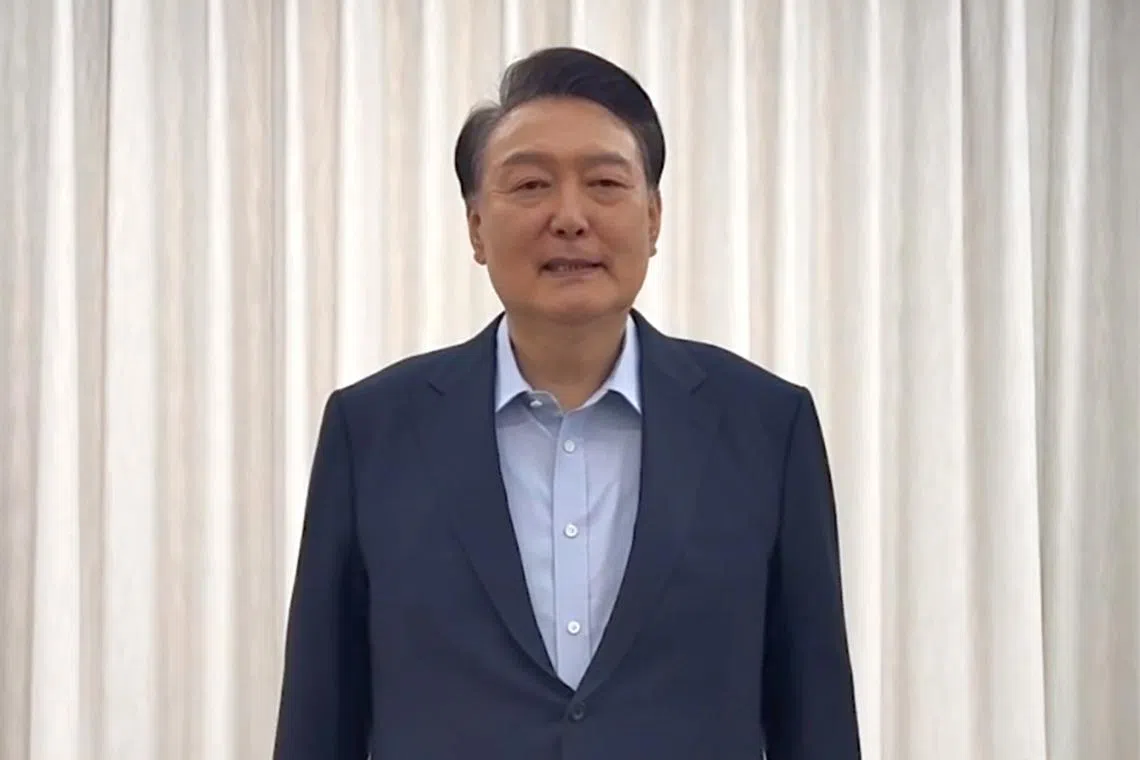Explainer: What to know about the arrest of South Korea’s impeached President Yoon
Sign up now: Get insights on Asia's fast-moving developments

Impeached President Yoon Suk Yeol issuing a statement at his official residence before heading to the headquarters of the Corruption Investigation Office for High-ranking Officials on Jan 15.
PHOTO: EPA-EFE
Follow topic:
SEOUL - South Korean investigators arrested impeached President Yoon Suk Yeol on Jan 15
Mr Yoon and the Corruption Investigation Office for High-Ranking Officials (CIO), which is probing his short-lived martial law decree
The authorities now have 48 hours to question Mr Yoon, before seeking a warrant to detain him for up to 20 days or releasing him.
Here is what is known about his arrest so far:
Who are the investigators?
The CIO is leading a joint investigation team involving the police and Defence Ministry seeking charges of insurrection and abuse of power against Mr Yoon, among others, while prosecutors carry out their own probe.
The CIO was launched in January 2021 as an independent anti-graft agency to investigate high-ranking officials, including the president, and their family members as part of efforts to keep prosecutors in check.
But its investigating and prosecuting rights are limited. It does not have the authority to prosecute the president and is required to refer the case to the prosecutors’ office to take any action, including indictment, once questioning is over.
What is Yoon’s argument?
Mr Yoon said on Jan 15 that he submitted himself for questioning to avoid any bloodshed despite what he called the illegality of the investigation and arrest.
His lawyers have said that the CIO does not have the authority to handle his case as the law stipulates a wide-ranging list of high-ranking officials and violations it can investigate, but has no mention of insurrection.
Prosecutors capable of investigating insurrection charges have been carrying out a separate investigation into Mr Yoon.
The lawyers also said that an arrest warrant granted by a Seoul district court was unconstitutional because it specified that the warrant was exempt from two clauses of the Criminal Procedure Act that limits seizure and search of a place subject to confidential military information, or a public official possessing official secrets, without providing legal grounds.
They said that any criminal investigation should be conducted after the Constitutional Court holds a trial on Mr Yoon’s impeachment and decides whether to remove him from office permanently.
Mr Yoon’s team has filed a complaint and an injunction with the Constitutional Court to review the warrant’s legitimacy, though the Seoul Western District Court, which issued the warrant, has rejected a similar complaint.
On Jan 3, the Presidential Security Service (PSS) and military guards blocked CIO investigators from arresting Mr Yoon in a six-hour stand-off. The PSS’ then chief, Mr Park Chong-jun, had said that the security service could not cooperate on the warrant, citing the legal debate over the CIO’s investigative rights and the warrant’s validity.
What is the position of the CIO and the police?
The CIO has said it has secured the rights to take on Mr Yoon’s case by obtaining the arrest warrant, and the two clauses of the Criminal Procedure Act do not apply because the warrant was limited to arresting him, not seizing his possessions.
But the agency has apologised for initially failing to arrest Mr Yoon and requested that the police take over the execution of the warrant, based on its consideration that “such a serious case as this one should not leave even the slightest possibility of controversy”.
Police have acknowledged that there was a legal dispute over such a transfer but said they would consult the CIO.
The CIO and the police held multiple meetings to discuss how to execute the warrant after securing a re-issued warrant on Jan 7.
Mr Yoon’s legal adviser, Mr Seok Dong-hyeon, said the bid to transfer the execution of the warrant is effectively an admission by the CIO that its probe and the warrant are “illegal”.
What do the courts say?
The Constitutional Court said on Jan 13 that it is reviewing the complaint and injunction filed by Mr Yoon’s lawyers.
The Seoul Western District Court, which previously dismissed a similar complaint, said it is not illegal for the CIO to handle Mr Yoon’s case as allegations of insurrection are included in abuse of power charges covered by the agency.
It also said the warrant’s exemption from the two Criminal Procedure Act clauses appears to confirm that any search that might entail was aimed at arresting the defendant, not seizing his belongings, and it was not unconstitutional for a judge to specify that when approving a warrant.
Mr Yoon’s lawyers criticised the court’s statement as “sophistry” and said they would consider appealing against the decision before a higher court. REUTERS

